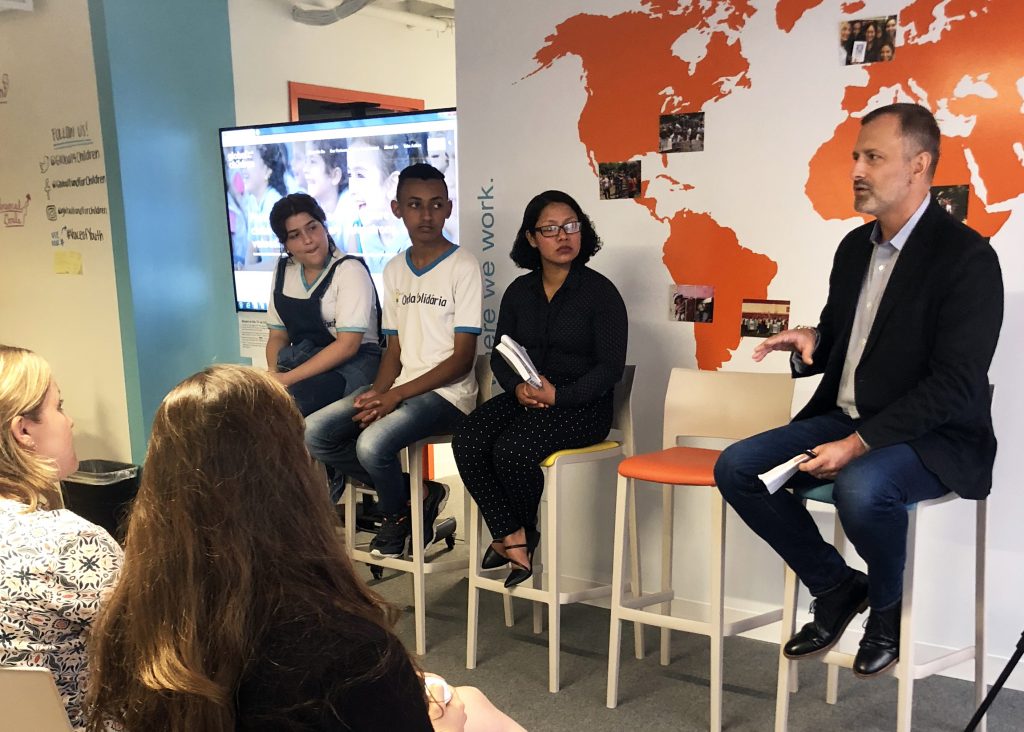Complexity, Smart Risks, and Big Bets

By John Hecklinger, President and CEO
Before I found my calling to work in international philanthropy and development, I was pursuing an academic career in English Language and Literature. During my graduate studies, I encountered the work of N. Katherine Hayles, specifically her book, “Chaos Bound: Orderly Disorder in Contemporary Literature and Science.” Hayles brought the seemingly disparate fields of science and literary criticism together, demonstrating how both moved from deterministic, linear explanations to a new paradigm concerned with systems, complexity, and emergence.
Just as science shifted from attempting to discover unifying theories to understanding complex systems, literary criticism rejected mining of meaning to embracing fluid interplay between author, reader, text, and context. Before the Internet emerged, literary criticism understood how radically fragmented and accessible information would result in idiosyncratic, personal understandings of reality – anticipating notions like “filter bubbles” and “truthiness.”
Scientists, humanities scholars, and development economists have traditionally regarded complexity and unpredictability as noise to be eliminated, but those fields now increasingly embrace complexity.
Complexity can help us investigate how meaning emerges from information, why the universe looks the way it does, and how a more sustainable, equitable global economy rooted in individual rights and freedom can develop.
Here are some principles of complexity useful in understanding this way of thinking:
• Spontaneous order emerges when energy is applied to a complex system in unpredictable ways that nevertheless adhere to some general patterns.
• Feedback loops reinforce emerging patterns, amplifying those patterns’ effects on the system as a whole.
• Biological evolution—with its random variations, unpredictable outcomes, but amazing ability to produce organisms perfectly fit for their environments, even when extremely hostile—provides a helpful way to understand the workings of complex systems.
• Patterns in complex systems tend to look the same at all scales. Rivulets leading to creeks, leading to streams, leading to rivers all look about the same when viewed at comparable distances.
So, what does this have to do with Global Fund for Children? Well, everything.
Even as contemporary thought leaders like Ben Ramalingam of the Overseas Development Institute and Owen Barder from the Center for Global Development demonstrate how global development can benefit from drawing on principles of complexity, much of the practice of philanthropy and global development follows an established linear path – if you invest enough money in smart enough ways, economic growth will ensue, and people will lead better lives.
Yet, as Owen Barder points out in his work on complexity and development, economists can’t agree on an explanation for the dramatically different growth rates of Ghana and Korea, which had about the same per capita GDP in 1957. Barder suggests the explanation lies in the difference in how those countries empowered their people, businesses, policy makers, and institutions to create enough potential in a complex system for economic development to emerge spontaneously. Development is not something to be directly funded, rather it is a spontaneous result of complex systems that generally empower people.
GFC exists to help grassroots organizations, rooted in local communities, try new ideas meant to expand the capability of young people. Our hypothesis is that these organizations can more quickly learn and adapt to changing conditions. They are brave and innovative, but not yet tested and proven.
This approach would seem to be consistent with principles of complexity, but how, practically speaking, might well-meaning people like me who influence resource flows ensure our practice embraces the complexity inherent in sparking social change?
Owen Barder suggests seven guiding policies. These policy recommendations resonated with me when I first encountered them in 2012 and have guided my thinking since. I joined GFC in 2017 in some measure because I saw its approach as consistent with these ideas.
Resist Engineering
GFC invests in the capacity of organizations to explore what works in their context, not what’s in our strategic plan. It’s not GFC’s program that we fund organizations to implement. We provide flexible funding to organizations for several years. With budgets generally smaller than $200,000/year, our average $13,000/year grant allows organizations to invest significantly in what they feel is important.
Resist Fatalism
GFC has an inherently optimistic view of the power of children and youth and invests in organizations that create circumstances within which children and youth can thrive. GFC initiates a process of learning and exploration within organizations and within a community of organizations learning from each other. We accelerate this process with modest funding and shape it by fostering collaboration and learning.
Promote Innovation
GFC supports local organizations that other funders are not yet ready to fund. These local organizations may or may not have new or unique ideas, but we fund work that would otherwise not be tried in a particular context. We promote a process of innovation even if the work of an organization is critical but not disruptive.
Embrace Creative Destruction
GFC should fund organizations only to the extent that they are truly accountable to those they serve. Ideally, NGOs funded by GFC should be primarily accountable to the children and youth they serve, and our funding should flow more in the direction of organizations that truly meet needs. GFC has work to do in this area – encouraging stronger feedback mechanisms between GFC, its partners, and the children and youth we collectively aim to serve.
Shape Development
Selection mechanisms should rise from the values and goals of the communities that an organization aspires to serve. GFC, by seeking truly locally led organizations, operates on the assumption that these organizations are more likely to be sensitive to community goals, aware of the norms they are hoping to reinforce or disrupt, and accountable to those they directly serve.
Embrace Experimentation
By taking what Jennifer Lentfer describes as “Smart Risks” on many organizations, GFC sparks experimentation at scale. We are thrilled when partners become Ashoka Fellows or CNN Heroes, and we celebrate with them when they grow big, but the learning process within an organization is more important than scale or recognition.
Act Global
Institutions, in order to be relevant elsewhere, need to embody the principles they exist to promote. At GFC, we try not to slip into more traditional, linear thinking in our work. Do our paperwork and reporting requirements align with our aspiration to keep funding truly flexible? Do we seek feedback from those we hope to serve, just as we encourage our partners to do?
Over time, GFC hopes that acting according to these principles will create conditions for strong patterns to emerge. Those patterns might look like great ideas replicating, major policies shifting, or effective organizations going to scale. When those patterns emerge, we hope others will recognize and invest in them as we continue to open space for new patterns to emerge.
The Audacious Project, an open innovation prize mechanism meant to drive large amounts of funding to truly transformative ideas exists to apply large amounts of funding to these emerging patterns. This approach has pitfalls, as the William and Flora Hewlett Foundation’s Larry Kramer points out in his “Against Big Bets” article. Big bets tend to seek quick wins that complex social change resists.
Perhaps the smartest big bet would be on the process of experimentation and discovery itself. A bet to put into action the latest thinking about development as a complex endeavor, being tackled over long periods of time by networks of interconnected individuals and institutions.
To make the smartest big bets, perhaps we need a correspondingly large investment in processes to surface emerging, beneficial patterns. Organizations like GFC, GlobalGiving, Echoing Green, and Ashoka pioneered this space and continue to surface promising ideas. In this way, GFC and other grassroots funders take smart risks, place small bets, and find emerging patterns ready to be amplified by big bets.
As Ben Ramalingam suggests in “Aid on the Edge of Chaos”: “Network approaches can help us understand development and humanitarian challenges in terms of an intricate web of social, economic, technological, political, and ecological relationships that alternately drive or inhibit change. The changes aid agencies seek to bring about can usefully be framed in terms of bringing about transformative changes in the patterns of these relationships.”
GFC’s works to stimulate networks of interconnected individuals and institutions all working to create positive change for children and young people. Our emerging impact indicator framework places emphasis on understanding how the organizations we fund become more networked over time, and thus more prepared to adapt to changes in their operating environment, new ideas emerging from peers, and feedback from the children and youth they serve.
Our north star as an organization is not simply increasing the number of children and youth served, but rather increasing how interconnected our partners are with each other and with the complex ecosystem of other entities working for, or against, empowerment of children and youth. By approaching our work in this way, we aspire to create conditions for many more children and youth to thrive.
